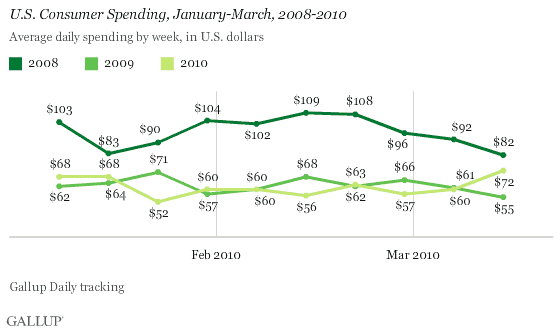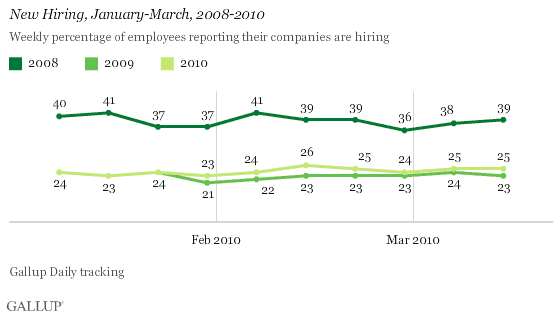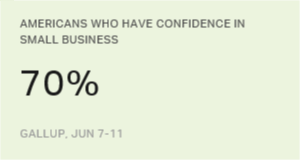PRINCETON, NJ -- With stocks at a new high for the year, pent-up demand from the snowstorms of prior weeks, and perhaps the arrival of some tax refunds, Americans' self-reported spending reached its highest level of the year during the week ending March 14.
Prior to last week, 2010 consumer spending was adhering to the relatively conservative "new normal" established in 2009. The question going forward is whether this new spending represents the beginning of a new, higher level of consumer spending -- somewhere between 2008 and 2009 spending levels -- or simply a short-term aberration in the "new normal" trend.

"Last week's increased spending is particularly encouraging, given that it was not a 'paycheck week.'"
Averaging $72 per day last week, consumer spending was up 20% from the prior week ($60) and 31% from the same week a year ago ($55), and at its highest level since the week ending Dec. 20.
Job Creation Not a Factor
If this is the beginning of a new spending trend, it doesn't appear to have been inspired by job creation. While job market conditions have improved compared to a year ago, most of the change comes from lower percentages of employees reporting that their companies are letting people go; there has been little growth in the percentage saying their companies are hiring.

Can Wall Street Drive Improvement on Main Street?
Last week's increased spending is particularly encouraging, given that it was not a "paycheck" week. More broadly, spending for the first 14 days of March averaged $66 per day -- up from $62 in January and $59 in February. If this trend continues, it could lead to a much-improved sales environment for the nation's retailers and small businesses. In turn, increased sales should stimulate new private-sector hiring -- the basis for a real, sustainable economic recovery. A stronger economy could also lead the Fed to consider changing the easy money policy it reconfirmed at Tuesday's Federal Open Market Committee meeting.
Caution is warranted, given the fact that the current uptick in spending is based on only a couple of weeks of data for March and has been accompanied by essentially no improvement in hiring. But it would be good news if the optimism on Wall Street this year finally began to translate into a better economy on Main Street.
Review and export the complete daily trends on these measures: Economic Indexes; Consumer Spending; Economic Outlook; Economic Conditions; Job Market
Learn more about Gallup's economic measures.
Survey Methods
For Gallup Daily tracking, Gallup interviews approximately 1,000 national adults, aged 18 and older, each day. The Gallup consumer spending results are based on random half-samples of approximately 500 national adults, aged 18 and older, each day. Results for the week of March 8-14, 2010, are based on telephone interviews with more than 3,000 adults. For these results, one can say with 95% confidence that the maximum margin of sampling error is ±3 percentage points.
Interviews are conducted with respondents on land-line telephones and cellular phones.
In addition to sampling error, question wording and practical difficulties in conducting surveys can introduce error or bias into the findings of public opinion polls.
